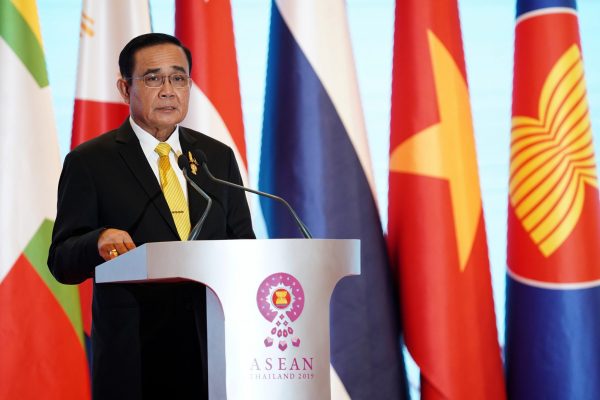Thai Prime Minister Prayut Chan-o-cha, 2014 military coup leader turned head of the now civilian government, has the privilege of hosting ASEAN meetings in 2019. The latest summit saw the adoption of many key deliverables, including the ASEAN Leaders’ Vision Statement on Partnership for Sustainability.
The Vision Statement reinforces Thailand’s priority of ‘advancing partnership for sustainability’. It urges ASEAN members to deepen cooperation with stakeholders both within and outside the ASEAN region to promote regional peace and stability. Among the long and ambitious list of objectives are addressing tensions in the South China Sea, cyber-security, economic growth, environmental protection and transnational crimes such as human and drug trafficking.
Explaining the annual priority further, Prayut specifically indicates it reflects the ‘dreams of creating a people-centred ASEAN Community that leaves no one behind’. He repeatedly refers to the ‘people-centred’ underpinning of the ASEAN Community at the opening ceremony of the 34th ASEAN Summit.
Prayut’s remarks are at odds with the ‘people-oriented’ references to the ASEAN Community which have appeared in earlier ASEAN documents. A ‘people-oriented’ community implies that ASEAN leaders get to decide what is best for the peoples of Southeast Asia, peoples who are only passive recipients of regional initiatives. In contrast, the idea of a ‘people-centred’ community depicts ASEAN citizens as playing an active and integral role in shaping regional policy.
The ‘people-centred’ emphasis is thus significant for civil society organisations (CSOs). It potentially enables CSO participation in ASEAN decision-making. For example, grassroots demands for a legally-binding agreement on migrant worker protection could not just be heard but accepted. Such an agreement with enforceable rules would benefit the 6.5 million intra-regional migrant workers much more effectively than the non-binding document adopted by ASEAN in 2017.
The ‘people-centred’ rhetoric has long been a fixture of the ASEAN Community blueprint but it has always been attached to the ‘people-oriented’ notion. The coupling of these two terms watered-down ASEAN’s commitment to its peoples and downplayed ASEAN citizens’ role in decision-making.
Prayut’s opening ceremony speech therefore seems refreshing given that Thailand was ruled by the military junta from 2014 until a ‘change’ in regime that only came with the March 2019 election. His speech signals to CSOs that they may be given a greater voice in regional affairs. Thailand is also making efforts to publicise ASEAN, broadcasting live ASEAN-related events on the Internet. It even released a public campaign urging ‘all Thais’ to be good ASEAN hosts. All of this suggests Thailand’s intention of bringing regionalism closer to the peoples.
Despite these seemingly positive developments, regional CSOs remain excluded from decision-making processes.
The ASEAN Civil Society Conference and the ASEAN Peoples’ Forum, for example, were denied an interface meeting with ASEAN leaders during the June 2019 summit. These organisations usually hold a meeting parallel to the summit and seek to influence various ASEAN policies on issues such as human rights protection, development, trade, environment, youth and culture.
When Thailand was ASEAN Chair in 2009, CSOs were granted a 30-minute meeting despite ongoing domestic political turmoil. The last CSO interface meeting occurred in 2015 during Malaysia’s Chairmanship. With the refusal in 2019, CSOs have been unable to secure a dialogue with ASEAN leaders for four consecutive years.
The refusal thus suggests the extension of Thailand’s domestic practice of suppressing local activism, dismissing the importance of a ‘people-centred’ ASEAN.
Following the rejection, officials said that ‘the door has not completely shut’ for members of civil society. They suggested CSOs request a meeting during the next summit in November 2019. Sceptics view this response as an empty promise, while others question whether the protection of Southeast Asian citizens may be more effective if CSOs bypass ASEAN bodies altogether.
As CSO preferences for engagement with ASEAN vary, activists need to collectively rethink whether they want to continue using the existing space that ASEAN has limitedly carved out for them — a type of participation CSO representatives call ‘controlled partnership’.
CSOs can seek alternative platforms outside of ASEAN in order to present a united front in pursuing their goals. Having a single, concerted voice can potentially have a stronger impact on shaping regional policies for the benefit of the peoples. CSOs can also strategise by leveraging the use of both spaces.
ASEAN itself needs to rethink what partnership means in order to stay relevant. Engaging with civil society cannot just be about co-opting diverse or dissenting voices. Realising the ambition of a people-centred ASEAN Community requires widening peoples’ participation in decision-making. Otherwise, regional community building will remain, as described by the current ASEAN host, simply a ‘dream’.
Ruji Auethavornpipat is a Sessional Lecturer in the Department of International Relations, Coral Bell School of Asia Pacific Affairs, The Australian National University.

